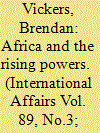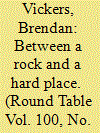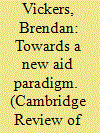|
|
|
Sort Order |
|
|
|
Items / Page
|
|
|
|
|
|
|
| Srl | Item |
| 1 |
ID:
120541


|
|
|
|
|
| Publication |
2013.
|
| Summary/Abstract |
With abundant resources and growing markets, the African continent is once again at the centre of a new 'great game of courtship' between the established and rising powers. However, compared with previous decades, African countries are no longer passive players in international relations.
This article explores Africa's recent negotiating behaviour in relation to a selected set of actors that animate the current shifting global economic order: rising powers, established powers and international organizations. Despite potential sources of bargaining leverage, most African countries (with some notable exceptions) are still reactive to the bilateral overtures of Brazil, China and India and unable to set the terms of engagement.
Nonetheless, the rise of these new powers provides alternative negotiating partners (and potentially more developmental outcomes) to the established powers. By comparison, at the multilateral level the African Group has been far more active and assertive in contesting global governance in the pursuit of greater distributive justice, particularly in the climate, trade and security regimes. This has taken place largely through the adroit use of distributive bargaining and tactics, supplemented by normative-based strategies highlighting Africa's underdevelopment.
The central argument of the article is that African countries require judicious negotiating strategies, improved deliberative capacities and coalitions with local/continental/global civil society and business networks in order to ameliorate their weaker bargaining power and reshape the terms of their engagement with their international partners, particularly the rising powers.
|
|
|
|
|
|
|
|
|
|
|
|
|
|
|
|
| 2 |
ID:
103861


|
|
|
|
|
| Publication |
2011.
|
| Summary/Abstract |
This article explores the role and effectiveness of small state trade diplomacy in the negotiations to conclude Economic Partnership Agreements (EPAs) between the European Union (EU) and the African, Caribbean and Pacific (ACP) group of countries, focusing specifically on the Southern African Development Community (SADC). Given the vast power asymmetries between the EU and the ACP, small states have had limited bargaining power to shape the process and the outcome of the negotiations. Unlike most other ACP EPA negotiations, the SADC small states were also caught between a rock (EU) and a hard place (South Africa), with both parties competing to promote their visions for regional integration. In the end, the EPA process split SADC into four sets of separate trade regimes with the EU, undermining the established regional integration project. The article explains this divisive outcome of the SADC EPA process by analysing the negotiation behaviour of the main parties, specifically the 'weaker' players. The article concludes with key lessons for small states' future trade negotiations.
|
|
|
|
|
|
|
|
|
|
|
|
|
|
|
|
| 3 |
ID:
118658


|
|
|
|
|
| Publication |
2012.
|
| Summary/Abstract |
As the largest African economy and the leading African aid-provider, with plans to establish an aid agency, South Africa is often ranked among the developing world's 'emerging donors'. However, the country's development cooperation commitments are smaller in scope, scale and ambition than the aid regimes of the BRIC (Brazil, Russia, India, China) or Gulf state donors. Given its limited resources and domestic socioeconomic challenges, South Africa prefers the role of 'development partner'. In this role, South Africa's development cooperation in Africa has ranged from peacekeeping, electoral reform and post-conflict reconstruction to support for strengthening regional and continental institutions, implementing the New Partnership for Africa's Development (NEPAD) and improving bilateral political and economic relations through dialogue and cooperation. This article seeks to determine whether Pretoria's development cooperation offers an alternative perspective to the aid policies and practices of the traditional and large rising donors. We conclude that South Africa does not fit neatly the 'donor' category of the Organization for Economic Cooperation and Development's (OECD's) Development Assistance Committee (DAC) and neither is Pretoria's aid-spending typically 'ODA' (official development assistance). Instead, with its new aid agency, South Africa occupies a unique space in Africa's development cooperation landscape. With fewer aid resources, but a 'comparative advantage' in understanding Africa's security/governance/development nexus, South Africa can play an instrumental role in facilitating trilateral partnerships, especially in Southern Africa.
|
|
|
|
|
|
|
|
|
|
|
|
|
|
|
|
|
|
|
|
|